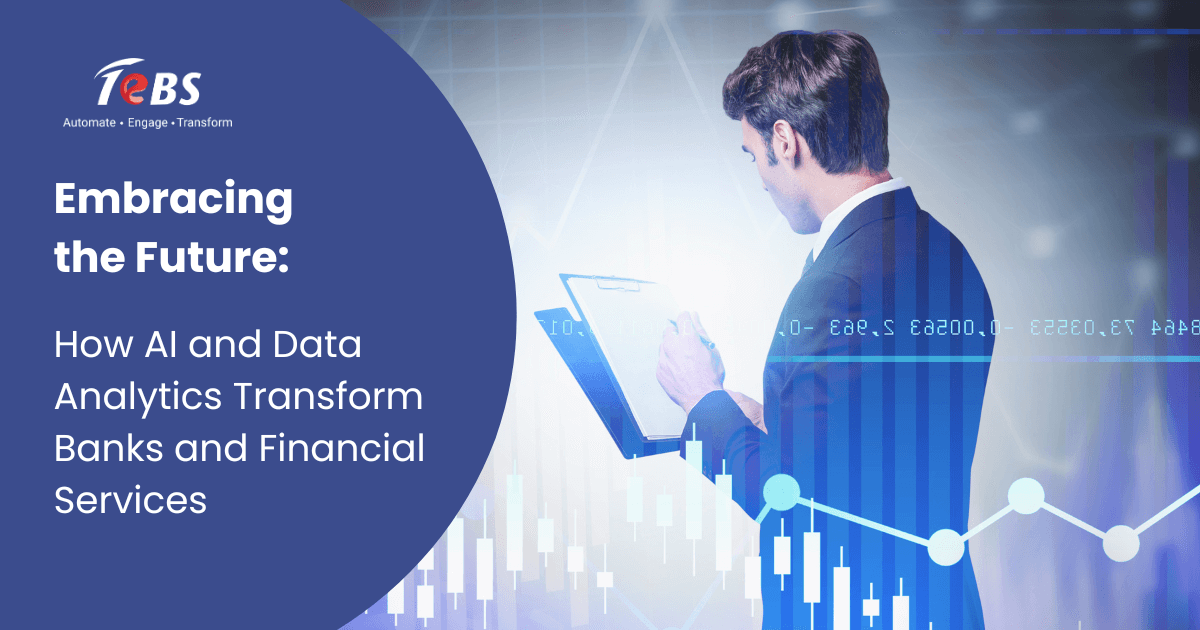In today’s fast-paced, data-driven world, the banking and financial services industry is undergoing a profound transformation. With the advent of Artificial Intelligence (AI) and advanced data analytics, these institutions are not only adapting to change but also gearing up to thrive in the future. In this blog, we will explore how AI and data analytics are shaping the future of banks and financial services, enabling them to stay competitive and better serve their customers.
-
Enhanced Customer Experience
In an era of digitalization, customers expect seamless and personalized experiences. AI and data analytics enable banks and financial institutions to analyze customer data, track their behavior, and provide tailored recommendations. Chatbots powered by AI offer instant customer support, while predictive analytics can anticipate customer needs and preferences. By harnessing these technologies, banks can create a more satisfying and engaging customer experience, leading to higher customer retention rates.
-
Risk Management and Fraud Detection
Risk assessment is a fundamental aspect of the financial industry. AI and data analytics algorithms can process vast amounts of data to identify potential risks and fraud in real-time. Machine learning models can detect anomalies in transactions, making it easier to identify and prevent fraudulent activities. Moreover, predictive analytics can help banks anticipate market trends and economic fluctuations, enabling them to make informed decisions and reduce risks associated with lending and investments.
-
Efficient Operations and Cost Reduction
Efficiency is paramount in the financial sector. AI-driven automation can streamline various processes, reducing operational costs. Robotic Process Automation (RPA) can handle routine tasks such as data entry and document verification, freeing up human resources for more complex tasks. Additionally, AI algorithms can optimize resource allocation and portfolio management, maximizing returns while minimizing costs.
-
Regulatory Compliance
Compliance with ever-evolving regulations is a constant challenge for banks and financial services. AI and data analytics can aid in monitoring and ensuring compliance. Machine learning algorithms can scan through documents, contracts, and transactions to identify potential compliance breaches. This not only reduces the risk of regulatory fines but also enhances the reputation of the institution as a trustworthy partner.
-
Personalized Financial Planning
For customers, financial planning is critical, and AI-powered tools can assist in creating personalized financial plans. By analyzing a customer’s financial data, AI algorithms can provide tailored advice on investments, savings, and retirement planning. This not only helps customers make informed decisions but also builds trust and loyalty with the institution offering these services.
-
Credit Scoring and Loan Approvals
Traditional credit scoring models are limited in scope, often leaving out crucial information about borrowers. AI can consider a broader range of data points, including social media activity, to assess creditworthiness more accurately. This allows banks to make better lending decisions and expand access to credit for underserved populations.
-
Wealth Management
AI-powered robo-advisors are becoming increasingly popular for wealth management services. These platforms use sophisticated algorithms to create and manage investment portfolios tailored to an individual’s financial goals and risk tolerance. This democratizes wealth management by making it more accessible to a broader audience.
-
Real-time Analytics and Market Insights
In the fast-paced financial markets, real-time data analysis is crucial. AI and data analytics can process vast amounts of market data in real-time, providing traders and investors with actionable insights. This capability allows financial institutions to adapt quickly to market changes and make data-driven decisions.
How TeBS can help
We offer a comprehensive suite of AI expertise and services tailored to the specific needs of banks and financial services institutions. Our data analytics experts have helped banks in integrating AI solutions into their infrastructure and developing end-user applications that leverage AI capabilities. For example, our data analytics experts have created solutions to automate email processing and intelligent chatbots that can help customers to navigate complex financial product documentation.
TeBS has established partnerships with major players in the AI industry, including Microsoft, AWS, and Big Tapp. These partnerships provide access to cutting-edge AI technologies and expertise, enabling our banking customers to leverage the latest advancements in AI.
Conclusion
The future readiness of banks and financial services relies heavily on their ability to harness the power of AI and data analytics. These technologies are not just tools for operational efficiency but strategic enablers for delivering a superior customer experience, managing risks, and making informed decisions. As the industry continues to evolve, those who embrace AI and data analytics will not only survive but thrive in the competitive landscape of the future. It’s an exciting journey into a world where data becomes the currency of trust, and innovation leads the way.





